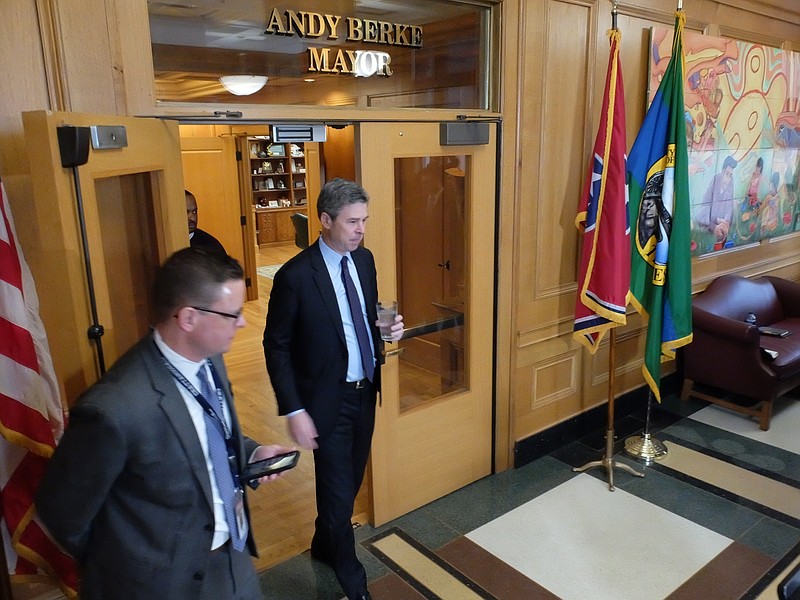Chattanooga is the only one of the state's four largest municipalities to never have elected either a female or Black mayor, but that could change in the city election less than seven months away.
Former River City Co. President Kim White last week became the fourth candidate to file paperwork with the Hamilton County Election Commission to potentially signal a run for mayor, but she has not made an official announcement of her intention.
Business consultant Monty Bruell, activist Christopher Dahl and business owner Tim Kelly also have filed paperwork for the position. Chattanooga City Councilman Russell Gilbert and Marine Corps veteran Andrew McLaren have publicly announced their candidacies for mayor but not filed paperwork. Bruell and Gilbert are Black.
Nashville and Knoxville (twice) have elected female mayors within the last decade, and Knoxville's current mayor is Indya Kincannon. Memphis has never elected a female mayor.
Memphis was the first of the state's four largest cities to have a Black mayor, J.O. Patterson Jr., who served as interim mayor for 20 days in 1982. The city elected its first Black mayor, Willie W. Herenton, in 1992.
Knoxville also had an acting Black mayor, Daniel Brown, who served for most of 2011 after then-Mayor Bill Haslam resigned following his 2010 election as governor of the state.
Chattanooga had Black candidates as major contenders for mayor in 1997 (Howard Roddy, who won 42.2% of the vote) and 2001 (Irvin Overton, 30.2%), but they lost to Jon Kinsey and Bob Corker, respectively. No Black candidate has been a major contender since.
The city nearly elected its first female mayor in 2005. Former River City Co. executive Ann Coulter captured the most votes in the March election to succeed Corker, who would go on to two terms in the United States Senate. But she got less than 50% of the vote and was forced into a runoff with City Councilman Ron Littlefield in a three-way race that also included Dan Johnson.
Littlefield picked up the support of Johnson, who went on to serve as chief of staff in his administration, and won 54.1% of the vote in the April runoff. He went on to serve two terms as mayor and was succeeded by the city's now term-limited current mayor, Andy Berke.
If White decides to run for mayor, she, Kelly, a car dealer, and Gilbert would likely be the principal combatants, though others could make inroads.
If the field remains the same - though there is plenty of time for other candidates to get in the race - the election could wind up being similar to 2005. Indeed, even the candidates would have some similarities.
Coulter and White both worked for River City. Gilbert would be a sitting councilman, just as Littlefield was. And Kelly is a businessman, as Johnson was.
The dynamic in the race is that Gilbert as a sitting councilman will be able to draw from an established base of voters and, being Black, could expand that in the wake of 2020's interest in the "Black Lives Matter" movement.
If the three remain the top names in contention throughout the campaign, an April runoff among the top two vote-getters - also like 2005 - is likely.
White will be able to get advice from Coulter, who is still a consultant in the area, but she won't be able to draw from Edith Spradley, who was the first woman to run for Chattanooga mayor in 1983. Spradley, who died in 1990, earned 2.1% of the vote in her history-making effort against winner Gene Roberts.
When she died, her obituary did not mention her bid for office, but when she jumped in the race she had no qualms about her ability.
"I am qualified to understand the needs of the working man," said Spradley, then business manager of the Chattanooga Orthopedic Clinic, according to newspaper archives. "After all, you cannot have this exposure without compassion for and sympathy and understanding of the needs and problems related to all wage earners."
She said being a female candidate "isn't all that easy" but that she "owed nobody anything" and felt she could give the city a bright future.
Spradley, at one juncture in the race, also told an audience, "Well, it seems that the city fathers haven't done the job; maybe a city mother can."
Bruell and Gilbert can call on Roddy and Overton for any pointers, but they weren't the first Black candidates to toss out their names for mayor. The first were William Days and Herbert H. Wright, both of whom were also-rans in the 1971 election.
Seven months is a long way to go, and there's another significant election in between, but the current situation offers a strong possibility one Chattanooga mayoral candidate could make history next year.
